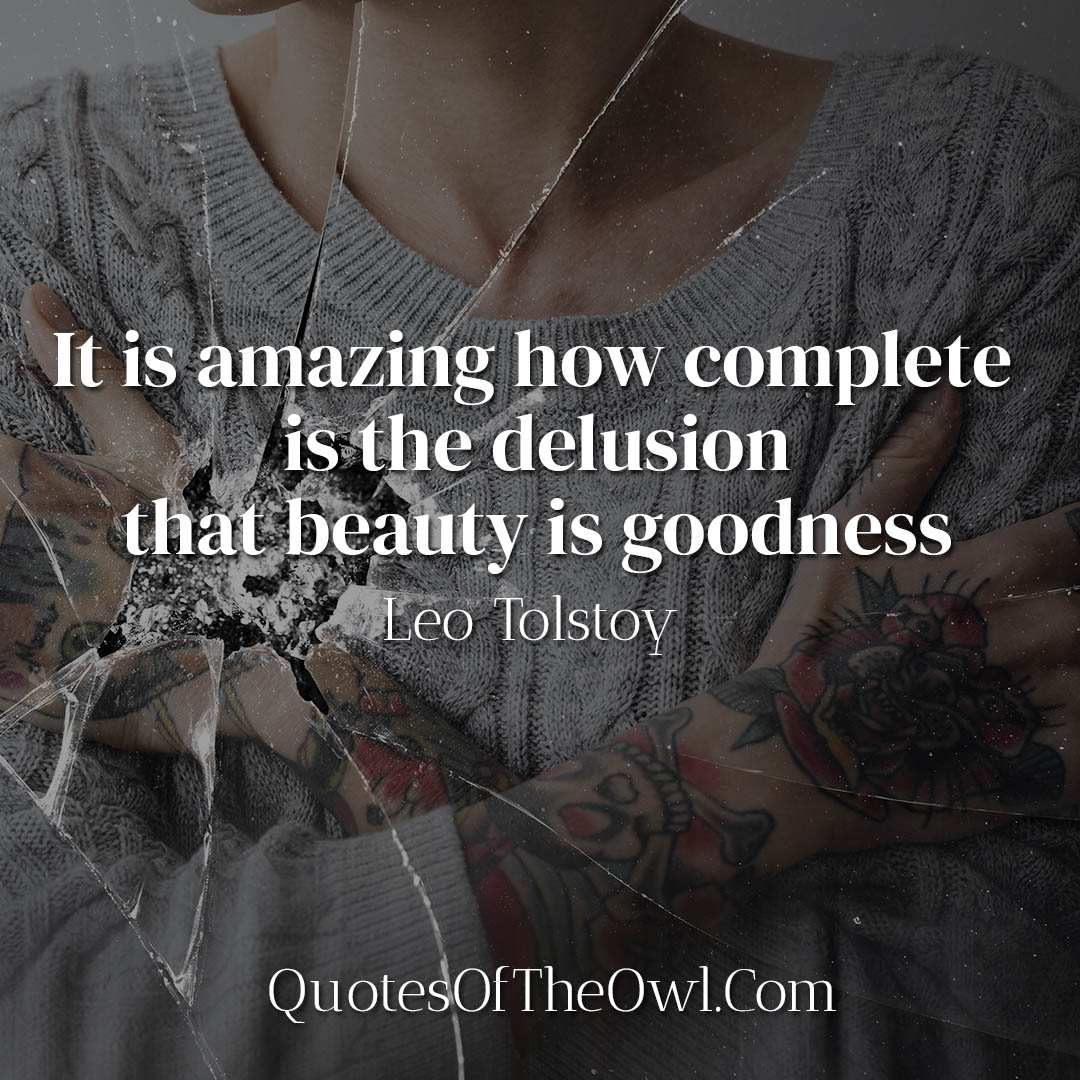What is the meaning of Leo Tolstoy’s Quote: “It is amazing how complete is the delusion that beauty is goodness”?
Leo Tolstoy, a renowned Russian author, philosopher, and thinker, left us with a profound quote that challenges our perceptions and societal norms. In this article, we delve into the deeper meaning of his quote, “It is amazing how complete is the delusion that beauty is goodness.” We explore the complexities of beauty, goodness, and their interconnectedness in the human mind.
The Deeper Meaning Behind the Quote
Tolstoy’s quote encourages us to introspect and examine our biases. It highlights the human tendency to attribute positive qualities to those who possess physical attractiveness. This phenomenon often occurs unconsciously and can lead to oversimplified judgments of character.
The Illusion of Beauty and Goodness
Often, we tend to associate physical attractiveness with moral virtue, assuming that beautiful individuals are inherently good. However, this perception can be deceiving, as genuine goodness is not solely determined by external appearances. The illusion of beauty and goodness highlights the importance of looking beyond the surface and delving deeper into a person’s character and actions to truly understand their moral worth. By recognizing this illusion, we can cultivate a more profound appreciation for the complexities of human nature and avoid making shallow judgments based solely on appearances.
Beauty and Morality
True goodness arises from an individual’s actions, empathy, and ethical choices. Moral virtues are not dependent on external appearances but are nurtured within the soul. Tolstoy’s quote reminds us not to confuse physical attractiveness with genuine moral worth.
The Influence of Society and Media
Society and media play a crucial role in perpetuating the delusion of beauty equating to goodness. Unrealistic beauty standards portrayed in the media contribute to the reinforcement of this illusion, leading to an ever-widening gap between appearance and character.
Beauty and Inner Qualities
The concept of beauty needs to expand beyond the physical realm. Inner qualities like kindness, integrity, and compassion are also aspects of beauty that deserve appreciation and admiration.
The Evolution of Perception
Throughout history, the perception of beauty and goodness has evolved. Cultural influences and changing norms have shaped our understanding of these concepts. Tolstoy’s quote challenges us to question these shifting paradigms critically.
The Importance of Self-Reflection
To overcome the delusion Tolstoy speaks of, self-reflection is crucial. Recognizing our own biases and preconceptions allows us to see beyond the surface and appreciate the depth of each individual.
Looking Beyond Superficiality
Breaking free from the delusion requires us to interact with others based on their actions and values rather than their appearance. This shift in perspective fosters a more inclusive and compassionate society.
Transcending the Delusion
As individuals, we have the power to transcend the illusion of beauty equating to goodness. By recognizing the limitations of superficial judgments, we can embrace diversity and celebrate the inner beauty that lies within each person.
Challenging Societal Norms
Challenging societal norms is a courageous act that fosters progress and positive change. Society often imposes rigid expectations and standards on individuals, limiting their true potential and stifling creativity. By questioning these norms and their underlying assumptions, we create space for diversity, inclusion, and innovation. Challenging societal norms requires bravery and a willingness to challenge the status quo, but it can lead to a more open-minded and accepting world. Embracing different perspectives and breaking free from the confines of tradition allows us to forge new paths and evolve as a society. Through this process, we cultivate a culture of acceptance and understanding, where everyone’s unique contributions are valued and celebrated.
Embracing Imperfections
Embracing imperfections is a powerful and transformative mindset. Instead of chasing an elusive idea of perfection, accepting our flaws and unique quirks can lead to a more authentic and fulfilling life. Embracing imperfections allows us to let go of the pressure to conform to unrealistic standards and to celebrate our individuality. It is through our imperfections that we connect with others on a deeper level, as we all share in the experience of being beautifully flawed human beings. By embracing imperfections, we free ourselves from the shackles of self-criticism and open ourselves up to self-love and self-compassion. It is in these imperfections that our true beauty shines through, making us whole and complete in our own right.
Conclusion
In conclusion, Leo Tolstoy’s quote, “It is amazing how complete is the delusion that beauty is goodness,” serves as a timeless reminder to look beyond appearances and embrace the complexity of human nature. By acknowledging the delusion, challenging societal norms, and practicing self-reflection, we can foster a world where true goodness is valued, and beauty is not confined to the superficial.
Explore the timeless wisdom of Leo Tolstoy in his unforgettable quotes!

